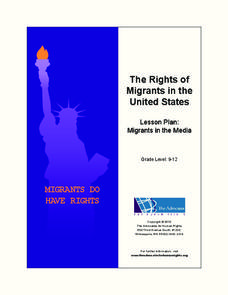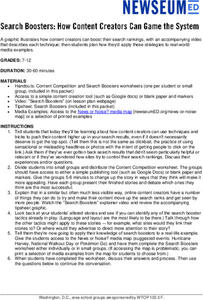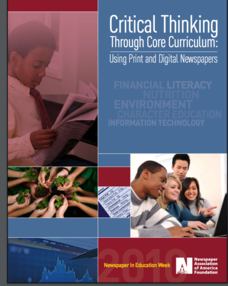Advocates for Human Rights
Migrants in the Media
Class members examine two documents—The Universal Declaration of Human Rights and The Rights of Migrants in the United States—and then use reports in the media to assess how well the US is doing in ensuring these rights.
Ontario
Critical Literacy—Media Texts
Media texts convey both overt and implied messages. As part of their study of media, class members analyze the language, form, techniques, and aesthetics in a variety of media texts.
PBS
Technology: Conveniences and Consequences
It's a delicate balance—using technology to improve our lives while still protecting the environment, and ourselves, from the hazards of technology use. Class members examine statistics about the increase in media use, complete a survey...
News Literacy Project
News Goggles: Covering a Newsworthy Trial
The trial of Derek Chauvin, former Minneapolis police officer charged in the death of George Floyd, is the focus of a lesson that asks pupils to compare how local, nationial, and international news organizations reported the testimony of...
Newseum
The Speed of News: Where Do We Get the News?
Times are changing. One change is the way people get and share the news. Class members pair up and interview one another to find out how their peers get news. After compiling their findings, young reporters interview an adult, compile...
English Enhanced Scope and Sequence
Media Literacy Applied
After investigating various forms of print, oral, and electronic media as sources of information, class members research a historical figure and produce a résumé for this person. While templates are provided for an initial sorting...
Media Smarts
Authentication Beyond the Classroom
In an age of fake news, alternative facts, and Internet trolls it is essential that 21st Century learners develop the skills they need to authenticate the facts in viral news. Here is a great way to begin with a resource that provides...
Facebook
Metadata
In previous lessons, young journalists learned about how to trace the original source of scrapes and memes. This interactive lesson plan teaches them another important step in the verification process. Participants learn how to analyze...
Newseum
Search Boosters: How Content Creators Can Game the System
Scholars examine the techniques content creators use to boost their search rankings. After watching a short "Search Boosters" video, groups select a story from the "News or Noise? Media Map" and analyze the devices used in the story. The...
Health Smart Virginia
Cyber Tattoo
Designed to inform high school freshmen about the ramifications of sharing personal information through social media, this lesson focuses on sexting. Investigators first check the validity of websites using a Website Evaluation Tool....
Federal Reserve Bank
Banking on Debit Cards
What are the advantages and disadvantages of using a credit card versus a debit card? What are the costs of using a debit card irresponsibly? Here you'll find a lesson on key concepts that every learner should know regarding personal...
Health Smart Virginia
Social Networking and You
The positive and negative impacts of social networking are the focus of a powerful lesson for high school freshmen. Class members explore the risks of oversharing online and watch a video of one girl's experience. The lesson ends with...
National Wildlife Federation
Understanding and Measuring School Electronics
Feel the power in turning off electronics. Using energy-monitoring devices, pupils find the amount of energy it takes to power a simple electronic when it is on and when it is off. They then calculate the cost for the entire year for the...
Facing History and Ourselves
Hands Up, Don't Shoot!
Why is it so difficult to develop a clear understanding of the events surrounding the shooting of Michael Brown by a Ferguson, Missouri, police officer? To answer this question class members listen to a NPR discussion of the findings of...
Purdue University
Email Etiquette for Professors
A student has failed an important exam. What's the best way for a teacher to break the news? A useful PowerPoint introduces professors to strategies for proper e-mail etiquette. Using the presentation, instructors learn how to correspond...
National Woman's History Museum
Rosie the Riveter: The Embodiment of the American Woman’s Economic and Social Awakening
Critical events force change. World War II forced a change in perceptions of and attitudes toward women. When thousands of men joined the military American factories were left shorthanded. Young historians investigate how media was used...
Health Smart Virginia
Mental Health/Social Emotional Skills
A 7-page packet of activity ideas, lesson plans, and information resources provides instructors of high school freshmen a wealth of materials to support teaching the concepts in a Health Smart unit.
National Institute of Open Schooling
Periodic Table and Atomic Properties
An in-depth lesson, the fourth activity in a series of 36, begins with teaching how the periodic table's arrangement came to its current design. Using this knowledge, pupils then move on to analyze the arrangement of elements to their...
Newseum
Search Signals: Understanding Your Top Hits
Class members watch a short video about the criteria used to drive search results to learn about how search engines work. Scholars use a "Search Signals" worksheet and a tip sheet to record information as they conduct a simple search of...
Nemours KidsHealth
Screen Time: Grades 3-5
Encourage pupils to spend less time in front of a screen with two lessons that challenge them to examine their habits and try to make new ones. In lesson one, the class brainstorms activities to partake in instead of spending time in...
Nemours KidsHealth
Screen Time: Grades 6-8
How much screen time is too much screen time? Even before COVID, tweens were spending hours watching TV, playing video games, and connecting with their friends by smartphone and computers. Two activities from Kids Health get young...
Nemours KidsHealth
Screen Time: Grades 9-12
Two engaging activities encourage teens to turn off their screens and tune into healthy activities. Learners use a tracker to assess their daily screen-time habits, read several articles about the value of exercise, then research the...
Utah Education Network (UEN)
Utah Open Textbook: Physics
Textbooks come in all shapes, sizes, and media these days. An electronic textbook resource offers Physics materials for an entire course. The text offers an explanation of physics topics as well as examples of calculations and reading...
Newspaper Association of America
Critical Thinking through Core Curriculum: Using Print and Digital Newspapers
What is and what will be the role of newspapers in the future? Keeping this essential question in mind, class members use print, electronic, and/or web editions of newspapers, to investigate topics that include financial literary,...
Other popular searches
- Electronic Media Project
- Art Electronic Media
- Electronic Media Management
- Electronic Media Syllabus
- Electronic Media Lessons

























